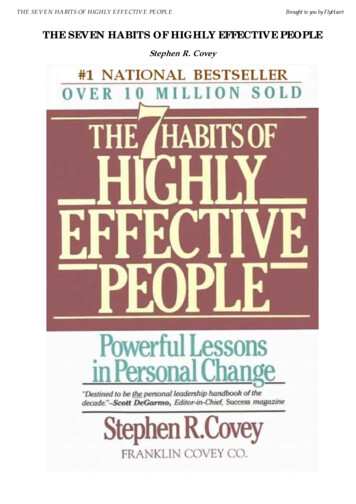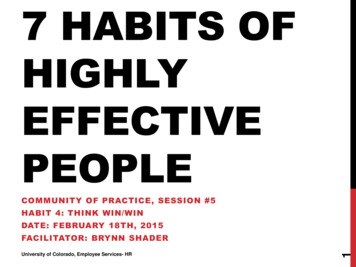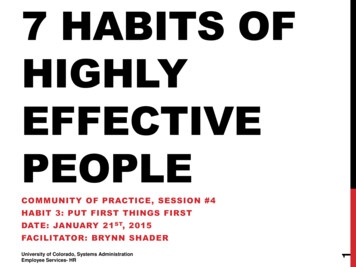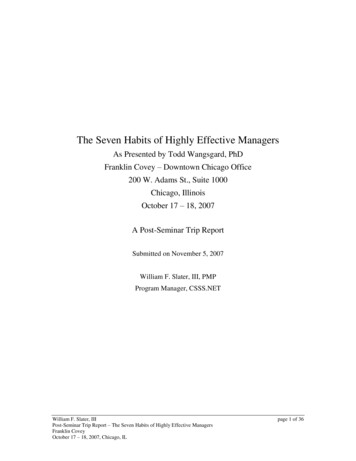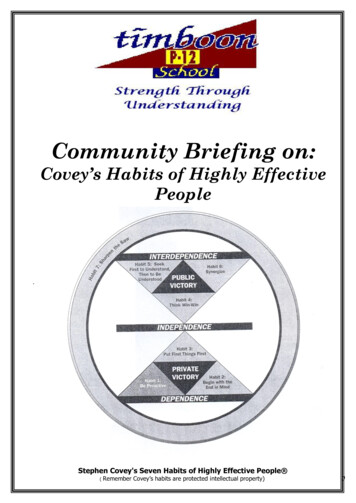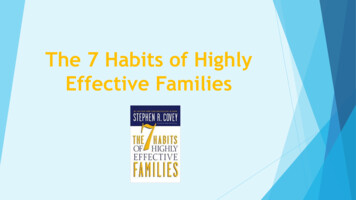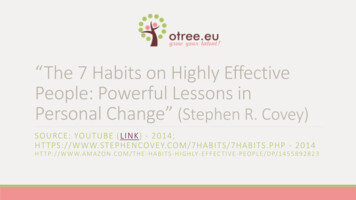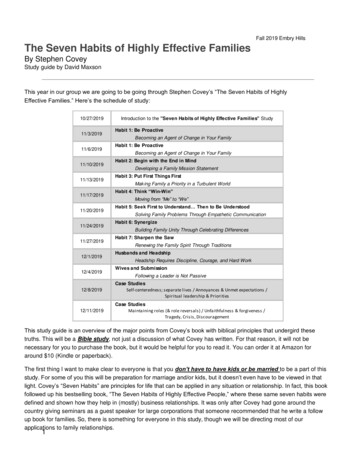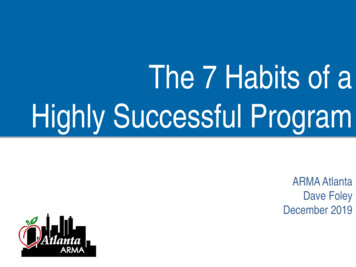
Transcription
7 Habits of Highly EffectiveTeens
Column AColumn B with your Group: Discuss where time could be saved from Column Aand complete column B together Set a goal based on the group‟s suggestionsand your own input Record this goal in Column C What have your learned from this andprevious activities from Habit #3? (i.e.Planning the Big Picture) Did anything surprise you? What did you find most valuable?
What is it like to be in a relationship withYOU? See page 131 – complete the table in yournotebook. In the Private Victory, we were learning how to say:“I am responsible for myself and I can create myown destiny.” The public victory will help you becomeINTERDEPENDENT: learning to work cooperativelywith others. Learning that: “I am a team player, and I have powerand influence with people.”
Habit 4 Think Win-winMutual Benefits.Have an“everyone can win”attitude.Win-win is like anall you can eat buffet.
After reading Pages 146-54, what do youthink this statement means? The PRIVATE VICTORY is the foundation for thinkingWin-Win! “Think Win-Win is the foundation for getting alongwith others. Why do you think this is so? It only takes one person to think win-win! WIN-WIN thinking gives the best results.What are the effects of Win-Lose, Lose-Winrelationships?
Win-Lose: The Totem Pole What are the characteristics of a Win-Lose attitude?(Page 149) What are the effects of these? Lose-Win: The Doormat Hiding your true feelingsinside is unhealthy „Let the little things go‟ butstand up for importantthings.
Lose-Lose: The Downward Spiral War is „lose-lose‟ whoever kills the mostpeople, wins the war. Romantic relationships Revenge Win-Win: The All-You-Can-Eat Buffet Caring about others and wanting them to succeed,also caring about yourself and wanting yourself tosucceed. See examples of Win-Win attitudes (Page 153)
Did any of you ask the otherperson to simply OPEN his/herhand? Why not? When the environment feelscompetitive, we often willautomatically play Win-Lose. WHEN IS COMPETITION HEALTHY? Motivates us to succeed (athletics, business,When you compete against yourself, or when itchallenges you to reach and stretch and becomeyour best.
Similar to competition(Read Page 156)Do not build your life based on how others aredoing.Win-Win or No Deal With your group, create a scenario (a shortskit, if you will) that depicts either a WinWin or a No Deal situations and act theseout in front of the class. Due: Tomorrow
Win-Win or No Deal With your group, create a scenario (a short skit, ifyou will) that depicts either a Win-Win or a NoDeal situations and act these out in front of theclass.Read and discuss the ‘Baby Steps’ on Page 162: Complete: #1 and #8 in your notebook. Add this to a journal entry over the weekend: Discuss how you are progressing with yourgoals, any thoughts or comments regarding the4th Habit we discussed this week (Due Monday)
“GOLDILOCKS” ACTIVITYTell the story of Goldilocks And the ThreeBears with your partnerYou must alternate each word Was it frustrating when your partner did not know thestory? When we listen to someonesincerely, we listen to thatperson from his or her frameof reference.
One of the greatest frustrations in life is that manypeople don‟t feel understood. This is due to mostpeople filling in the blanks unnecessarily whentalking to people. Instead, an effectivecommunicator really tries to understand as muchinformation as possible about the situation beforeproviding a solution. Teens will learn that ifsomeone comes to them with a situation, to hear thatperson out and that it often requires the full storyand some questions before the correct plan of actionis revealed. This means listening and attempting tosee the situation from the speaker‟s perspective andnot just their own.
Habit 5 Seek First to Understand,Then to be UnderstoodCommunicationsolvesproblems.Listen topeoplesincerely.
YOU HAVE TWO EARSAND ONE MOUTHLISTEN TO PEOPLE SINCERELY
Identify a poor listening style that you haveexperienced. When you needed or wanted someone tojust listen and they didn’t.
1. SPACING OUT – Ignoring what people are sayingbecause we are too focused on our own thoughts.2. PRETEND LISTENING – “Uh huh” pretty selfexplanatory.3. SELECTIVE LISTENING –Only paying attention to theinformation that interests you.4. WORD LISTENING –Paying attention to someone‟sWORDS and not their bodylanguage (focusing on WHATthey are saying, not HOW theyare saying it).
5. SELF-CENTERED LISTENING – Listening from yourown point-of-view. “I know exactly how you feel” no,you don‟t. You know exactly how YOU feel, not the otherperson. JUDGING ADVISING PROBING Which style(S) of listening do you struggle with? Givea specific example(s)GOAL FOR THIS WEEK: Which one(s) will youpractice un-doing this week?
5. SELF-CENTERED LISTENING: JUDGING – Jumping to conclusions or adding yourown opinion to what someone is saying without reallyhearing THEIR point of view first. ADVISING – Giving advice based on your ownexperience and not allowing the person to feelunderstood before you jump in. PROBING – Asking a lot of questions when peoplearen‟t ready to give up the answers.
1. LISTEN WITH YOUR EYES53%HEART40%EARS7%LISTEN TO WHAT PEOPLE AREN’T SAYING;It’s not always what the person is saying, but howthey are saying it.
2. STAND IN THEIR SHOES:Try to see the world asthey see it and try to feelthe way they feel.3. PRACTICE MIRRORING:Reflect on what the other person is saying: repeat back inyour own words what they are saying/feeling. Understand the difference between MIRRORING andMIMICKING (copy these from page 173) Practice Mirroring (Phrases P.175) Choose at least one „GoodListening Skill to practice this week
When we listen with the intent to understand others, ratherthan with the intent to reply, we begin truecommunication and relationship building.Seeking to understand takes kindness; seeking to beunderstoodtakes courage.Effectiveness lies in balancing the two.Please read Pages 176 -
Communicating with Parents1. Have you ever stopped to consider that perhaps?2. Parents may have unfulfilled dreams they‟ve had toso that you can reach yours.3. Two incredible things will happen if you take time to listen toyour parents; you‟ll gain greater for them andyou‟ll get much more often.4. Parents will be more and they‟llyou more.5. You can better understand your parents by6. Name a deposit you can make into your parents‟ RBA:(your own example).
Seeking to be Understood7. Seeking first to understand requires ,but seeking to be understood requires .8. If you only practice the first part of Habit 5, what kind ofsituation will you be in? Why?9. You‟ve got to share or they‟ll.10. Giving is an important part of seekingto be understood.11. What two points should you keep in mind when givingfeedback?12. Review the Baby Steps for this Habit (P.180) Complete# 8. Move on to Habit #6 if you are finished.
Synergy is achieved when two or more peoplework together to create something better thaneither could alone.Through this habit, you can learn that it doesn’thave to be “your way” or “my way” but rather abetter way, a higher way.Synergy allows you to value differences andbetter appreciate others.
Habit 6 SynergizeOpen-mindedness. Teamwork. New ways to dothings. Work together to achieve more.Celebrate differences.A fruit salad is delicious precisely because eachfruit maintains its own flavor.
HOMEWORK FOR FRIDAY, APRIL 1 EXAM on Thursday (Habits 1-5) STUDY Complete a journal entry: Part I: Seek First to Understand and Then to Be UnderstoodReflecting on your poor listening skills as well as the Goodlistening skills that you have been practicing over the weekend(Mirroring, Eyes, Heart, Ears, and Standing in Their Shoes) Have you been successful with these new listening techniques?Have you noticed a difference in your relationships with the peopleyou have tried these with? Part II: Synergy Do you agree with the results of the personality survey youcompleted? Why or why not? APRIL FOOLS about the Exam, but we will have a test on Habits3-7 the week after next. *Please finish reading Habit 6*
LISTENING GOALS Share your listening goals with a partnerWHAT WERE YOUR PARTNER’S LISTENINGGOALS? HOW SUCCESSFUL HAVE THEY BEEN?
CREATING SYNERGY SYNERGIZE WITH YOUR GROUP: Organize a plan for a school fundraising event Follow the guidelines on the handout provided(Steps 1-12) as you come up with a ‘plan’ . Your group will present your plan next period. Other groups will observe each plan, noting:Creativity Completeness Adherence to guidelines Practicality Ease of selling plan to school and staff andparents Evidence that plan is a team effort Presentation
ROADBLOCKS TO CELEBRATINGDIFFERENCES IGNORANCE – Cluelessness – having no ideawhat others have been through or how they feel.CLIQUES – Groups of people who reject thosewho are not exactly like them.PREJUDICE – A prejudgment of someone basedon how they look, sound or where they come from
GETTING TO SYNERGYCopy the ‘Action Plan’ on Page 195. See ‘Teamwork and Synergy’ Can you relate to these roles that often appear ingroups? Which role do you most closely identify with? Read the ‘Baby Steps’ on Page 202. Complete #5 and #7 Group Activity – Make A Banner for the 7 Habits SYNERGY
HABITS 3-6 TEST – MONDAY, APRIL 11TH Review:Habit 3: The Four Quadrants, Planning (Big Rocks & Pebbles),The two halves of Habit 3 (Time management and overcomingfear/peer pressure) Habit 4: The ‘Public’ Victory (what does this mean, what canit help you achieve) The 4 situations (what they are compared to,characteristics of each, their outcomes) Win-Lose,Lose-Win, etc. The ‘Tumor Twins’ Habit 5:Walking in another’s shoes Poor Listening Styles Genuine Listening: The three ‘good’ listening skills
HABITS 4-6 TEST – MONDAY, APRIL 11THHabit 5 (continued) Communication with parents Habit 6: Meaning of SynergyWhat it is/is notYour ‘fruit’ (characteristics)Roadblocks to celebrating differences The two images from class (choose one and respond)
Jun 28, 2012 · Have you been successful with these new listening techniques? Have you noticed a difference in your relationships with the people you have tried these with? Part II: Synergy Do you agree with the results of the personality survey you completed? Why or why not? APRIL FOOLS about the Exam, but we will have a test on
